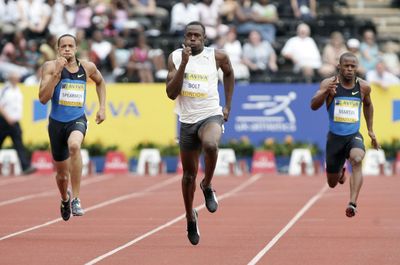Island of sprinters
Bolt has high hopes

SHERWOOD CONTENT, Jamaica – In the thriving heart of the land of the best sprinters on earth, in the tiny village that produced the world’s fastest man, nothing appears to be moving, save for the smoke rising from a distant field. But all around is that which is planted in the fertile ground – sugar cane, coffee beans, yams – to be harvested when the time is right, the better specimens packaged and sent forth to carry the country’s good name abroad.
In life-giving earth such as this, there always is the possibility of one awesome specimen that will rise from this island to redefine for the rest of the world what is organically possible.
It is happening right now. His name is Usain Bolt.
The 6-foot-5 sprinter, with a stride that chews up ground like a cheetah’s and owner of the fastest 100-meter time in history – a 9.72-second burst that stunned the world of track and field May 31 – Bolt rose from this farming village near Jamaica’s northern shore, graduated from schoolboy phenom to worldwide wonder and will lead a talented contingent of Jamaican sprinters, bent on capturing a bounty of gold, to the Beijing Summer Games, which begin Friday.
Jamaica, an island of 2.8 million residents, boasts a disproportionate number of the world’s elite sprinters. None is more talented or more breathtaking to behold than Bolt, the son of a general-store owner and a dressmaker whose first races as a preteen were run without shoes on grass tracks.
To judge from the hushed platitudes of those who have witnessed Bolt’s greatness, and who have the experience to put it in the proper context, there appears to be nothing stopping him from achieving a triumphant double victory in the 100 and 200 in Beijing – nothing, that is, except his own coach. Despite the rising roar of destiny surrounding Bolt – an international prodigy for nearly seven years but still a few weeks shy of his 22nd birthday – Glen Mills still has not committed to allowing him to enter both events.
“The 100 meter, we need to work out and master,” Mills told reporters as recently as last Saturday, four days after Bolt, following a poor start, was beaten by countryman Asafa Powell in the 100 at a meet in Sweden. “He just got up and ran and abandoned all strategy, the response of an inexperienced runner.”
Bolt, a 200 specialist who only began running the 100 competitively in 2007 – the world record came in only his fifth race at the distance – has vowed to do as his coach wishes, but there seems little chance Mills would deny his charge this opportunity and deny the world the spectacle of a showdown between Bolt and his two main rivals – Powell, whose 100-meter mark he shattered, and American Tyson Gay, the reigning world champion in both events.
If Bolt competes in one event, it almost certainly would be the 200, in which his personal best is 19.67, the fifth-fastest time in history. He has the potential to threaten Michael Johnson’s world record, once thought untouchable, of 19.32. Last Saturday in London, Bolt ran a 19.76 while, by all accounts, easing up over the final 15 to 20 meters.
“He can be the very best athlete in the history of track and field,” said Donovan Bailey, the Jamaican-born, Canadian-reared champion who won gold in the 100 at the 1996 Atlanta Games. “I think he can run a 19-flat. There’s almost nothing that is out of the question with this young man.”
Bolt’s story is not only of a talented athlete who rose from teen-age prodigy to worldwide fame, but of a country that, despite its modest size, consistently produces some of the world’s best sprinters – and does it while largely avoiding the stain from drug scandals.